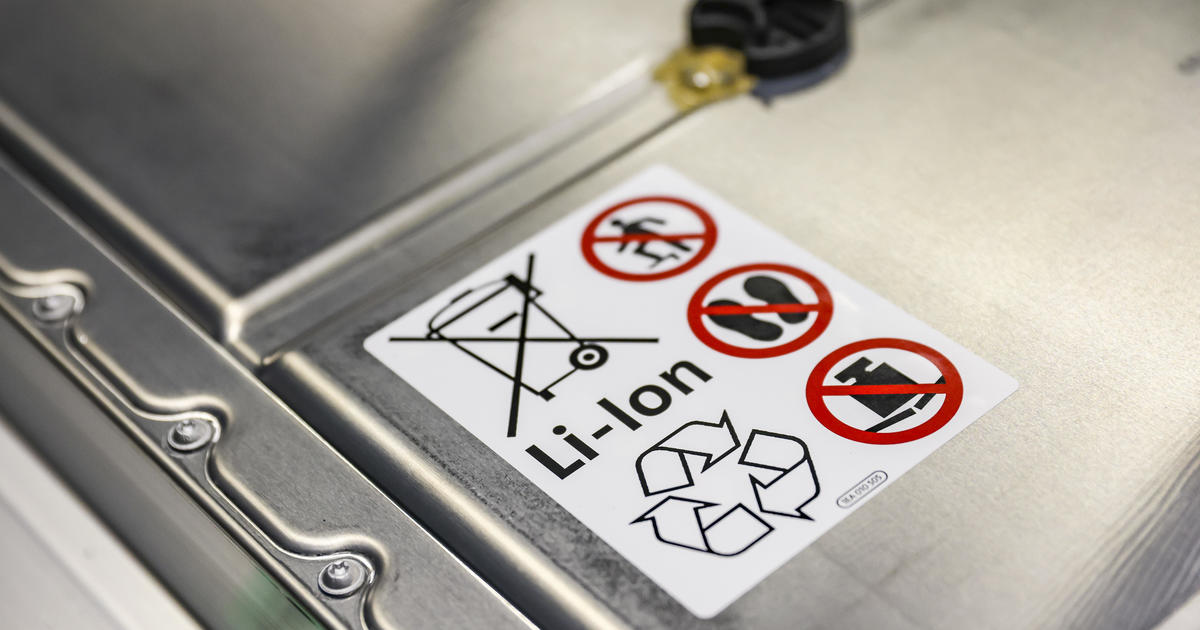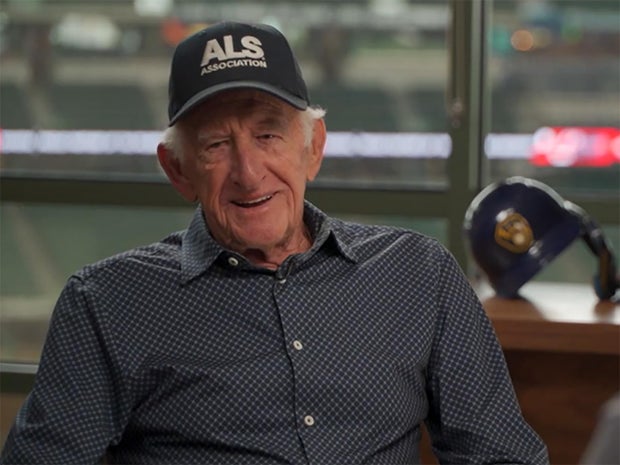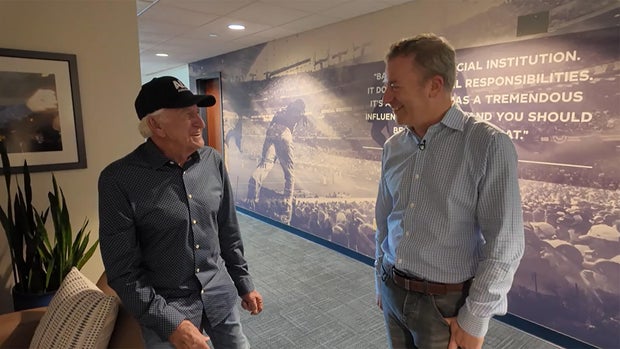CBS News
Why don’t lithium-ion batteries work as well in the cold? A battery researcher explains.

Wesley Chang is an assistant professor of mechanical engineering and mechanics at Drexel University.
Rechargeable batteries are great for storing energy and powering electronics from smartphones to electric vehicles. In cold environments, however, they can be more difficult to charge and may even catch on fire.
I’m a mechanical engineering professor who’s been interested in batteries since college. I now lead a battery research group at Drexel University.
In just this past decade, I have watched the price of lithium-ion batteries drop as the production market has grown much larger. Future projections predict the market could reach thousands of GWh per year by 2030, a significant increase.
But, lithium-ion batteries aren’t perfect – this rise comes with risks, such as their tendency to slow down during cold weather and even catch on fire.
CBS News
Behind the Li-ion battery
The electrochemical energy storage within batteries works by storing electricity in the form of ions. Ions are atoms that have a nonzero charge because they have either too many or not enough electrons.
When you plug in your electric car or phone, the electricity provided by the outlet drives these ions from the battery’s positive electrode into its negative electrode. The electrodes are solid materials in a battery that can store ions, and all batteries have both a positive and a negative electrode.
Electrons pass through the battery as electricity. With each electron that passes to one electrode, a lithium ion also passes into the same electrode. This ensures the balance of charges in the battery. As you drive your car, the stored ions in the negative electrode move back to the positive electrode, and the resulting flow of electricity powers the motor.
While AA or AAA batteries can power small electronics, they can be used only once and cannot be charged. Rechargeable Li-ion batteries can operate for thousands of cycles of full charge and discharge. For each cycle, they can also store a much higher amount of charge than an AA or AAA battery.
Since lithium is the lightest metal, it has a high specific capacity, meaning it can store a huge amount of charge per weight. This is why lithium-ion batteries are useful not just for portable electronics but for powering modes of transportation with limited weight or volume, such as electric cars.
Battery fires
However, lithium-ion batteries have risks that AA or AAA batteries don’t. For one, they’re more likely to catch on fire. For example, the number of electric bike battery fires reported in New York City has increased from 30 to nearly 300 in the past five years.
Lots of different issues can cause a battery fire. Poorly manufactured cells could contain defects, such as trace impurities or particles left behind from the manufacturing process, that increase the risk of an internal failure.
Climate can also affect battery operation. Electric vehicle sales have increased across the U.S., particularly in cold regions such as the Northeast and Midwest, where the frigid temperatures can hinder battery performance.
Batteries contain fluids called electrolytes, and cold temperatures cause fluids to flow more slowly. So, the electrolytes in batteries slow and thicken in the cold, causing the lithium ions inside to move slower. This slowdown can prevent the lithium ions from properly inserting into the electrodes. Instead, they may deposit on the electrode surface and form lithium metal.
If too much lithium deposits on the electrode’s surface during charging, it may cause an internal short circuit. This process can start a battery fire.
Making safer batteries
My research group, along with many others, is studying how to make batteries that operate more efficiently in the cold.
For example, researchers are exploring swapping out the usual battery electrolyte and replacing it with an alternative electrolyte that doesn’t thicken at cold temperatures. Another potential option is heating up the battery pack before charging so that the charging process occurs at a warmer temperature.
My group is also investigating new types of batteries beyond lithium ion. These could be battery types that are more stable at wider temperature ranges, types that don’t even use liquid electrolytes at all, or batteries that use sodium instead of lithium. Sodium-ion batteries could work well and cost less, as sodium is a very abundant resource.
Solid-state batteries use solid electrolytes that aren’t flammable, which reduces the risk of fire. But these batteries don’t work quite as well as Li-ion batteries, so it’ll take more research to tell whether these are a good option.
Lithium-ion batteries power technologies that people across the country use every day, and research in these areas aims to find solutions that will make this technology even safer for the consumer.
This article is republished from The Conversation under a Creative Commons license.
CBS News
A visit with “Mr. Baseball” Bob Uecker

Watch CBS News
Be the first to know
Get browser notifications for breaking news, live events, and exclusive reporting.
CBS News
A visit with “Mr. Baseball” Bob Uecker

Ever since Babe Ruth was waddling around the bases, there have been grim predictions about baseball’s future: Time has passed on the national pastime, too leisurely, too bucolic. Last year’s World Series TV ratings, and this season’s batting averages, both hit 50-year lows. Baseball, they say, is dying.
But never mind the current World Series between two of the game’s stalwarts, the New York Yankees and the Los Angeles Dodgers. Want to feel better about baseball’s health? Just go to a Milwaukee Brewers game.
There, in Major League Baseball’s smallest market, cheese curds sweat under floodlights, frozen custard unspools into batting helmets, hometown Miller flows liberally, and on the stadium’s second level is the most authentic Milwaukee touch of all: the broadcaster they call “Mr. Baseball.”
CBS News
In six undistinguished seasons as a catcher in the majors, Bob Uecker never played an inning for the Brewers. But during half a century as the team’s play-by-play announcer, he’s become equal parts mayor and mascot in the city of his birth, all the while declining offers from bigger markets – laying off pitches, as it were.
In the 1980s Yankees owner George Steinbrenner tried to recruit Uecker. “Steinbrenner sent a couple of people out to talk to me about joining the Yankees,” he said, “but I loved Milwaukee. Born and raised here!”
Uecker began his major league career in 1962 with the Milwaukee Braves before the franchise moved to Atlanta. “I was the first player from Milwaukee to ever be signed by the Braves,” he said. “I was also the first Milwaukee native to be sent to the minor leagues by the Braves!”
If Uecker’s on-field inadequacies hampered his playing career, they’ve provided some of his best material in a lengthy and lucrative second career as an actor and comedian. Employing a bone-dry wit, he made more than 40 appearances on Johnny Carson’s “Tonight Show.”
He said, “I did ‘Tonight Shows,’ you know, whenever they wanted. I would leave here on a Sunday afternoon, fly to L.A., do the Monday night show, take a red-eye back here, and be here for Tuesday’s game.”
Johnny Carson: “Give me, fast as you can, all the teams you’ve ever played with.”
Uecker: “Braves, Cardinals, Phillies, and the Braves again. Then, in June, I was with …”
The Carson guest spots led to a series of notable TV commercials, as well as a starring sitcom role, and perhaps most memorably as Harry Doyle, the perpetually blitzed announcer in the “Major League” movies. This past summer, at Milwaukee’s American Family Field, “Harry Doyle Bobblehead Night” brought the Uecker faithful out in force.
Asked his favorite “Bob Uecker line,” he replied, “‘Juuuuust a bit outside.’ That’s where my wife put me a lotta times!”
CBS News
Before serving 16 years as baseball’s commissioner, Bud Selig owned the Brewers, and, in 1971, hired Uecker, misguidedly, as a scout. Selig said it is “legitimately true” that Uecker wasn’t cut out to be a scout. “There were mashed potatoes on the damned scouting report. I couldn’t read it. He couldn’t read it,” he said.
So, Selig moved Uecker to the Brewers’ broadcast booth later that year.
Today there’s even a statue honoring Uecker, where else? In the very last row of the upper deck, behind a pole.
CBS News
But for all the stardom, all the gigs and gags, the late-night-laughs at his own expense, Uecker still fancies himself a player, says Brewers pitcher Brandon Woodruff: “He lets us know about his catching days. He’s one of us. He’s part of the team. And I think that’s why we embrace him so much, is that he’s on this ride with us. And that’s what makes it cool.”
According to Uecker, he has a bond with the players on the field: “I played the game. So, I know how hard it is. I know how tough it is to play this game. The game celebrations, when we win, that’s a big part of it, man, to be able to walk into that clubhouse and be with ’em.”
But baseball is cruel, and in Milwaukee, celebrations are short-lived. Earlier this month, with the Brewers just two outs from winning the National League Wild Card Series, the New York Mets came from behind on a dramatic home run.
On the radio, Uecker didn’t hide the hurt: “I’m tellin’ ya, that one … had some sting on it.”
The Brewers’ first World Series title will have to wait.
There’s speculation that the heartbreaking loss may have marked Uecker’s last game as an announcer. But as his 91st birthday nears, the man they call “Mr. Baseball” told us he doesn’t want to imagine his life without it.
“I don’t know what I would do, you know, with no more. If I think of no more baseball for me, I don’t know what that would be like, you know?” Uecker said. “I got out of high school and I joined the Army. And I signed a baseball contact. That’s been it, really!”
For more info:
Story produced by Robert Marston. Editor: Lauren Barnello.
CBS News
Ralph Fiennes on the provocation of acting

Watch CBS News
Be the first to know
Get browser notifications for breaking news, live events, and exclusive reporting.








